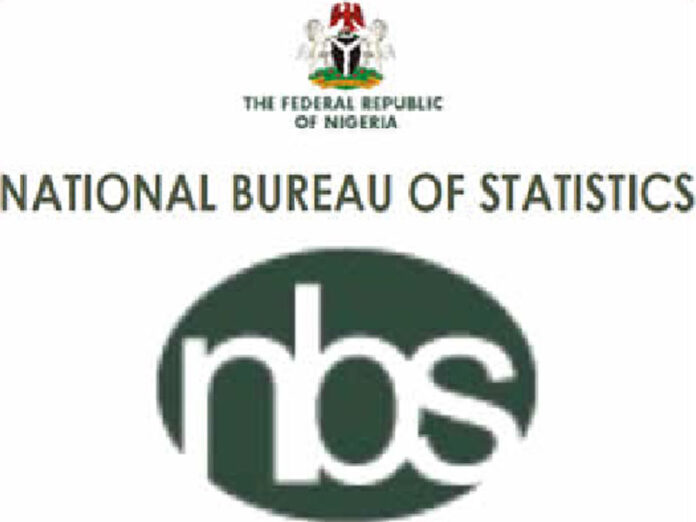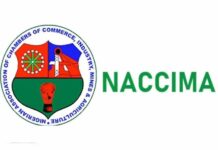Obiora Metu
Nigeria’s inflation rate has dropped to 15.60 per cent compared to the 15.63 per cent recorded in December 2021, according to the National Bureau of Statistics (NBS).
The Statistician General of the Federation, Dr Simon Harry who revealed this at a press briefing in Abuja on Tuesday said
the country’s inflation fell by 0.87 per cent year on year from the 16.47 per cent recorded in January 2021.
“This shows that headline inflation rate slowed down in January when compared to the same month in the previous year. Increases were recorded in all COICOP divisions that yielded the Headline index,” the NBS boss said.
On a month-on-month basis, the headline index, inclusive of items with volatile prices like food and fuel, increased to 1.47 per cent in January 2022, which is 0.34 per cent points lower than the 1.82 per cent recorded in December 2021.
According to Dr Harry, this rise in the food index was caused by increases in prices of bread and cereals, food products potatoes, yam and other tubers, soft drinks, oils and fats and fruit.
He added that on a month-on-month basis, the food sub-index increased by 1.62 per cent in January 2022, down by 0.57 per cent points from 2.19 per cent recorded in December 2021.
The NBS said, The average annual rate of change of the Food sub-index for the twelve months ending January 2022 over the previous twelve-month average was 20.09 per cent, 0.31 per cent points from the average annual rate of change recorded in December 2021 (20.40) per cent.
“The urban inflation rate increased to 16.17 per cent year-on-year in January 2022 from 17.03 per cent recorded in January 2021, while the rural inflation rate increased to 15.06 per cent in January 2022 from 15.92 per cent in January 2021.
“On a month-on-month basis, the urban index rose to 1.53 per cent in January 2022, down by 0.34 per cent points from 1.87 per cent the rate recorded in December 2021.
“The rural index also rose to 1.42 per cent in January 2022, down by 0.35 per cent points from 1.77 per cent of the rate recorded in December 2021″.
Dr Harry further explained that “the eight months declining trajectory on the inflation rate in Nigeria was broken by the December, 2021 Headline Inflation of 15.63 percent, year-on-year. This was a slight increase of 0.23% points over the November, 2021 figure of 15.40%. As reported last, the change in the declining trend might have been caused by the increase in prices of goods and services as a result of upsurge in their demand during the festive season”.
He however noted that rural inflation rate increased by 15.06 percent in January 2022 from 15.92 percent in January 2021, which was lower by 0.86 percent points, adding that on a month-on-month basis, the urban index rose by 1.53 percent in January 2022, which was down by 0.34 percent points from 1.87 percent, being the rate recorded in December, 2021.
“The rural index also rose by 1.42 percent in January, 2022, which was down by 0.35 percent points from 1.77 percent the rate recorded in December, 2021. The corresponding twelve-month year-on-year average percentage change for the urban index was 17.44 percent in January, 2022. This was lower than 17.52 percent reported in December, 2021. Rural inflation rate in January, 2022 was 16.31 percent, compared to 16.40 percent recorded in December 2021”, he added.
“This rise in the food index was caused by increases in prices of Bread and cereals, Food product such as Potatoes, yam and other tuber, Soft drinks, Oils and fats, and fruits. On month-on-month basis, the food sub-index increased by 1.62 percent in January, 2022, which was down by 0.57 percent points from 2.19 percent recorded in December, 2021. The ‘’All items less farm produce’’, he said.
On State by State comparison, Dr Harry said Abuja was highest on all items inflation on year-on- year basis with 18.59% followed by Kogi with 18.28% and Bauchi, 17.61%, adding that Kwara on the other hand, recorded the lowest with 12.94% followed by Niger with 14.10% and Oyo, 14.19%.
He also noted that food inflation on a year-on-year basis was highest in Kogi with 22.61% followed by Enugu with 19.84% and Akwa-Ibom (19.67%), while Sokoto had 14.18%, Bauchi (14.63%) and Kaduna (15.01%) as the lowest in January 2022.





















